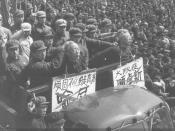Plan of Investigation (154)This investigation assesses the role of the Chinese Communist Party in the massacre and cannibalism of Guangxi Province in 1968, during the peak of the Cultural Revolution: was the central government responsible for the death of 200,000 people?Claiming as many lives as the Nanking Massacre, the mass killing and cannibalism which took place in the rural areas of Guangxi autonomous region remains one of the biggest taboos in China. . Understanding the context to decipher the root cause is the aim of this paper. The prompt requires extensive research on what instigated the factional war and the governmentÃÂs involvement throughout. I will employ the Scarlet Memorial,by Mr. Zheng Yi and a dissertation titled ÃÂState Sponsorship or State Failure? Mass Killings in Rural China, 1967-68ÃÂ, by Professor Yang Su as my primary sources. Other sources include interviews with witnesses, doctors, government consultants, as well as literature by Chinese and Western historians, and organizational behaviorists.
Summary of Evidence (450)In the early 1960ÃÂs, Mao sought to refocus the public on his goal of a ÃÂcontinuous revolution.ÃÂ The violent year of ÃÂclass strugglesÃÂ in 1968 is the pinnacle of the perilous decade that caused 2.8 million deaths and political dissonancy resonant even forty years later.
Background to the Factional WarsAnswering MaoÃÂs call, in 1966, Revolutionary Committees were established nation-wide to open all levels of government, from officials in the Politburo to municipalities in rural counties for the ÃÂcriticism and judgment of the sharp-eyed massesÃÂ . The targets of this movement, ÃÂclass enemiesÃÂ, spanned from ÃÂanti-revolutionaryÃÂ artists to doctors, ÃÂlandlordsÃÂ to ÃÂcapitalist roadersÃÂ, teachers to students . Mass gatherings were held where these people were openly humiliated. At this point, the public still adhered to MaoÃÂs call for Verbal Struggle . Meanwhile, because local governments were disbanded and upper party members were...


